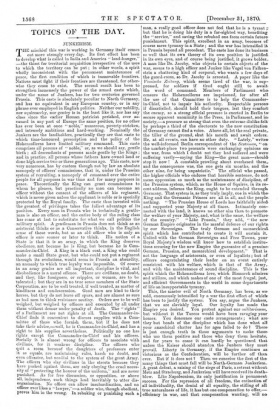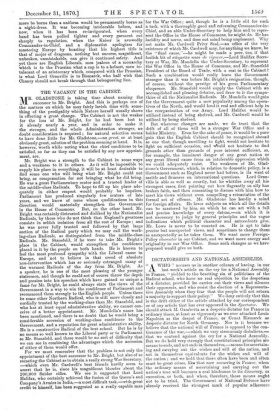TOPICS OF THE DAY.
JUNKERISM.
THE mischief this war is working in Germany itself comes out more strongly every day. Its first effect has been to develop what is called in India and America "land-hunger," —the thirst for territorial acquisition irrespective of the uses to which the territory can be put ; in other words, a spirit wholly inconsistent with the permanent maintenance of peace, the first condition of which is immovable frontiers. Nations must fight if their frontiers are threatened, for other- wise they cease to exist. The second result has been to strengthen immensely the power of the armed caste which, under the name of Junkers, has for two centuries governed Prussia. This caste is absolutely peculiar to North Germany, and has no equivalent in any European country, or in any phrase ever employed in English politics. Neither our nobility, nor squirearchy, nor gentry is in the least like it, nor has any class since the earlier Roman patriciat perished, ever as- sumed in any part of Europe the same position, for no other has ever been at once "noble," numerous, poverty-stricken, and intensely ambitious and hard-working. Nominally the Junkers are the landholders, practically they are that caste to which time-honoured prescription and the policy of the Hohenzollerns have limited military command. This caste comprises all persons of "noble," or, as we should say, gentle birth ; all descendants of persons made gentle by the Kings ; and in practice, all persons whose fathers have owned land or done high service two or three generations ago. This caste, now very numerous, has by custom though not by law an absolute monopoly of officers' commissions, that is, under the Prussian system of recruiting, a monopoly of command over the entire people for all purposes in war time and for- many purposes in peace. Theoretically the King can grant commissions to whom he pleases, but practically no man can become an officer without the consent of the officers of his regiment, which is never given unless the applicant is noble or is specially protected by the Royal family. The caste thus invested with the greatest of privileges takes the fullest advantage of its position. Every man in Prussia who is technically a gentle- man is also an officer, and the entire body of the ruling class has come at last to substitute for what we call politics the military spirit. A gentleman in Prussia does not think as an aristocrat thinks or as a Conservative thinks, in the English sense of those words, but as an old officer who is only an officer is sure sooner or later to think. His notion of a State is that it is an army, in which the King deserves obedience, not because he is King, but because he is Com- mander-in-Chief. A King in a black coat, a King who could make a small State great, but who could not put a regiment through its evolutions, would seem in Prussia an absurdity, an anomaly to which true loyalty was impossible. Of course in an army grades are all important, discipline is vital, and disobedience is a moral offence. There are civilians, no doubt, and they, like foreigners, or cripples, or women, are to be tolerated ; but they are in no true sense members of the State Corporation, are to be well treated, if well treated, as matter of kindliness and condescension. Good men are kind to their horses, but they do not leave off spurs, and are almost as sure as bad men to think resistance mutiny. Orders are to be well weighed, but weighed by officers and executed by all under them without demur under penalty of death. The " rights " of a Parliament are not rights at all. The Commander-in- Chief finds it convenient to discuss supplies with a Com- mittee of those who furnish them, but if he does not take their advice,—well, he is Commander-in-Chief, and has a right to his supplies nevertheless. Politically no one has rights except the Commander-in-Chief and his officers. Socially it is almost wrong for officers to associate with
civilians, for it weakens discipline. The officers who quit a room because the daughters of professors enter it as equals, are maintaining rules, harsh no doubt, and even offensive, but needful to the system of the great Army. The officers who slay civilians in the streets because they have pushed against them, are only obeying the cruel neces- sity of "protecting the honour of the uniform," and are never punished. As for free discussion, or opposition, or above all, independence, such things lead inevitably to utter dis- organization. No officer can allow insubordination, and no officer ever likes a "lawyer,"—a soldier who, though obedient, proves him in the wrong. In rebuking or punishing such a
man, a really good officer does not feel that he is a tyrant but that he is doing his duty in a far-sighted way, benefiting the "service," and saving the rebuked one from certain future. punishment. This spirit, excellent in an army, becomes of course mere tyranny in a State ; and the war has intensified it in Prussia beyond all precedent. The caste has done its business. so well that its own theory of its own position is justified. in its own eyes, and of course being justified, it grows bolder.. A man like Dr. Jacoby, who objects to certain objects of the war, seems to a high officer and Junker like Vogel von Falken- stein a chattering kind of corporal, who wants a few days of. the guard-room, so Dr. Jacoby is arrested. A paper like the Vossische Zeitung, which seems tired of the war, is sup- pressed, for soldiers if tired ought still to await. the word of command. Members of Parliament who censure the Ilohenzollerns are imprisoned, for after all the use of that Committee is to help the Commander-- in-Chief, not to impair his authority. Respectable persons- if dissatisfied, should hold their tongues, lest they comfort the enemy, so a strong official pressure is exerted in Berlin to. secure apparent unanimity in the Press, in Parliament, and in society,—a pressure so strong that even the extreme dislike felt by perhaps a third of the electorate to the new constitution of Germany cannot find a voice. Above all, let the real private?, the tiller of the ground, shut his month and await orders.- He, at all events, can have no other duty. "Lately," writes: the well-informed Berlin correspondent of the Scotsman, "on the market-place two peasants were exchanging opinions on the war, from which I doubt not they had suffered and were suffering vastly—saying the King—the great man—should. stop it now ! A constable prowling about overheard them,. and the consequence was, the one gets six months, and the other nine, for being unpatriotic." The official who passed, the higher officials who endorse that horrible sentence, do not. mean oppression so much as the maintenance of discipline, of the Prussian system, which, as the House of Squires, in its re- cent address, informs the King, ought to be extended through Germany. That system is, as they truly imply, one in which the- King and the Germanic Princes are all in all, and the people nothing. "The Prussian House of Lords has faithfully aided and supported your Majesty at all times. Intimately con- nected with the land, it knows no other aim than to promote the welfare of your Majesty, and, what is the same, the welfare of the country." "Like Prussia," they add, " the new German Empire originates in the manful defence of our rights. by our Sovereigns. The truly German and monarchical, spirit which has contributed to create it will sustain it. United with the German Sovereigns and Free Towns, your Royal Majesty's wisdom will know how to establish institu- tions securing for the new Empire the guarantee of a genuine- German, Prussian, and monarchical development." That is not the language of aristocrats, or even of loyalists ; but of officers congratulating their leader on an event entirely- consistent with his welfare, which is that of the Army,. and with the maintenance of sound discipline. This is the spirit which the Hohenzollerns love, which Bismarck admires- and utilizes, and which makes of one of the most frugal, just, and efficient Governments in the world in some departments, of life an insupportable tyranny.
This, the master evil of North Germany, has been, as we said, enormously intensified by a war the first effect of whichr has been to justify the system. You say, argue the Junkers, that we are slavishly loyal. Our loyalty has made the Empire you desired. You protest against our militarismas, but without it the Turcos would have been ravaging your homes. You denounce our caste arrangements ; what are- they but bonds of the discipline which has done what all your anarchical chatter has for ages failed to do ? There is just enough truth in those arguments to make those, who use them positive and those who deny them hesitate, and for years to come it can hardly be questioned that unless the Kaiser should abandon the Junkers they must. prevail. Liberty in Germany, if the Empire continues as- victorious as the Confederation, will be further off than ever. But if it does not ? Then we conceive the first of the many things that must fall will be North-German Junkerism- A great defeat, a raising of the siege of Paris, a retreat without Metz and Strasburg, and Junkerism will have received its death- blow. Like Napoleonism, its only justification is permanent success. For the repression of all freedom, the extinction, of all individuality, the denial of all equality, the stifling of all true naturalness of life, it has but one compensation to offer,— efficiency in war, and that compensation wanting, will no more be borne than a uniform would be permanently borne as a night-dress. It was becoming intolerable before, and now, when it has been re-invigorated, when every band has been pulled tighter and every garment cut sharply to regulation, when the Kaiser is avowedly Commander-in-Chief, and a diplomatist apologizes for mastering Europe by boasting that his highest title is that of major of dragoons, nothing but success, magnificent, unbroken, unmistakable, can give it continued safety. And yet there are English Liberals, men jealous of a monarchy which is to the Prussian what a cap is to a helmet, men in- tolerant of an aristocracy which, compared with the Prussian, is what Lord Granville is to Bismarck, who half wish that Chaney should not break through that beleaguering line.



































 Previous page
Previous page